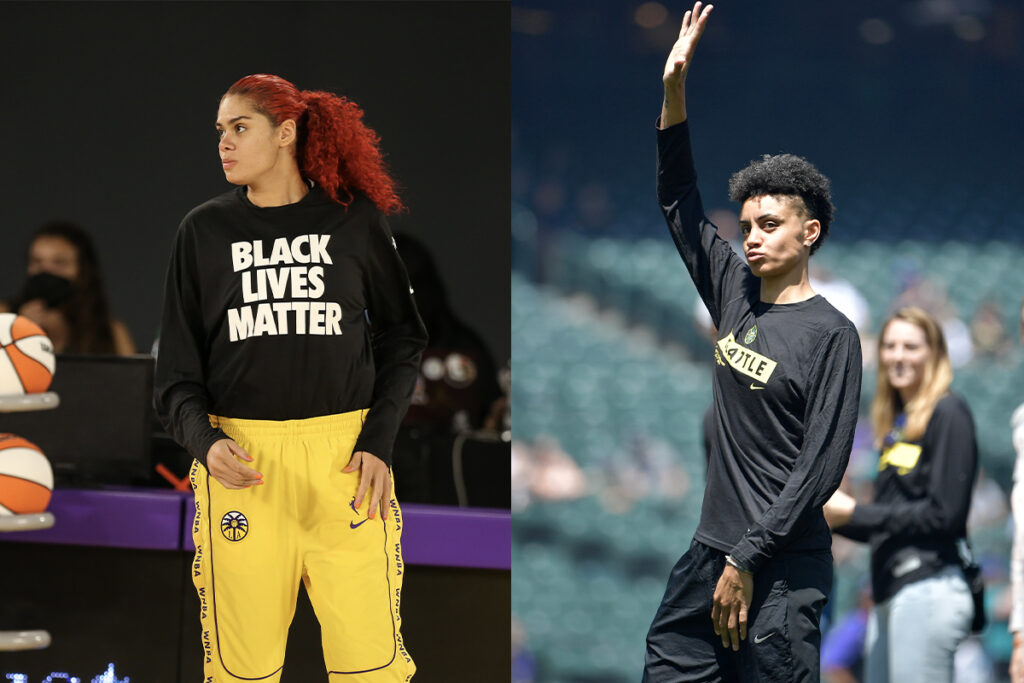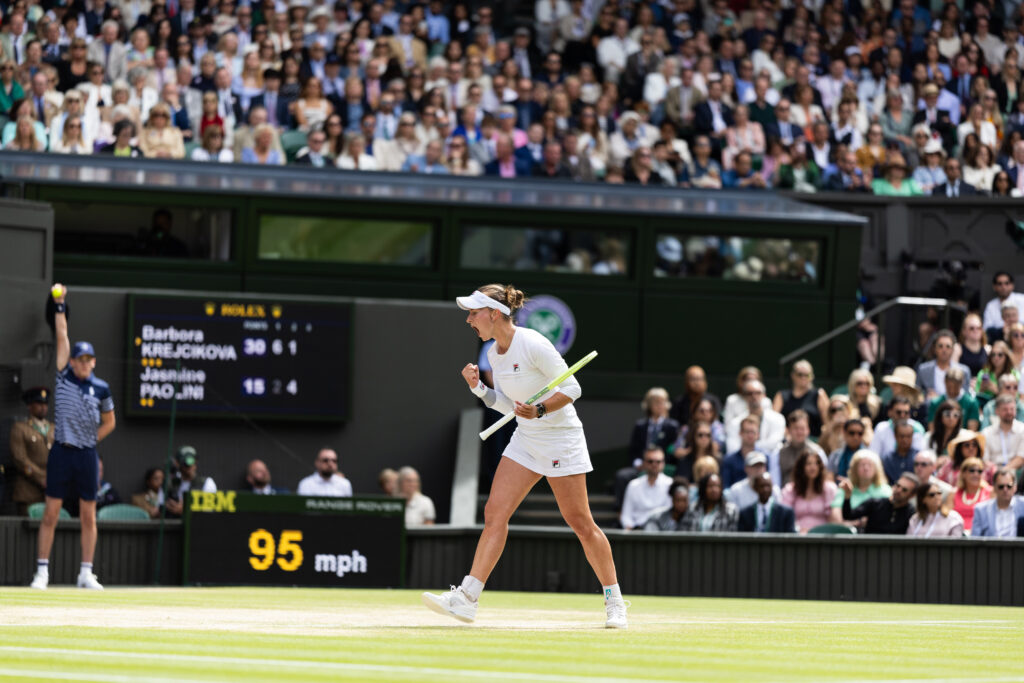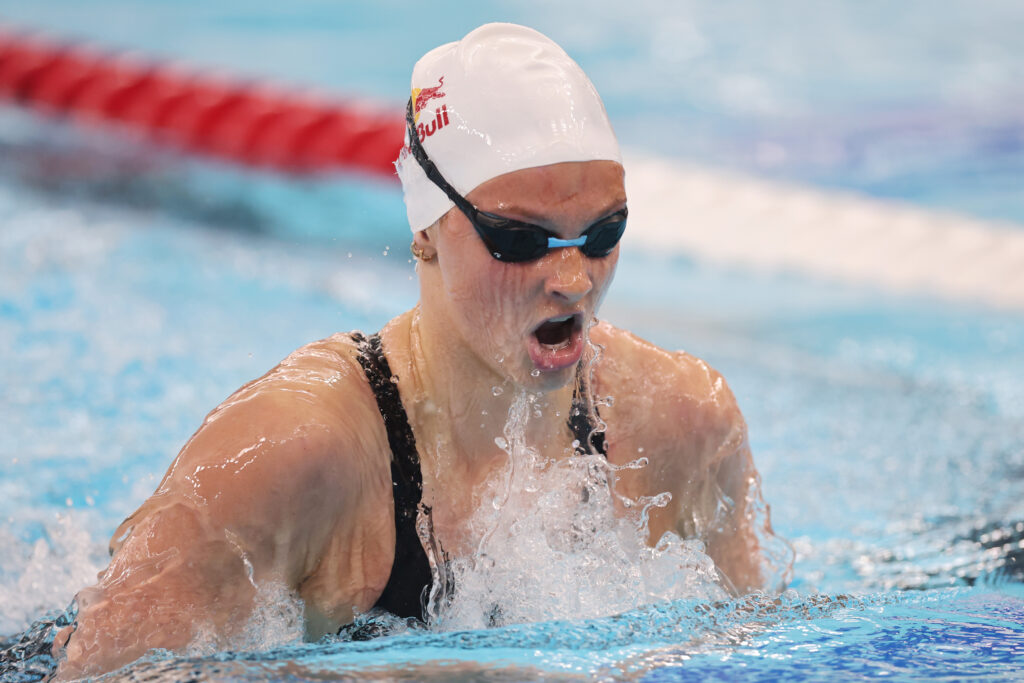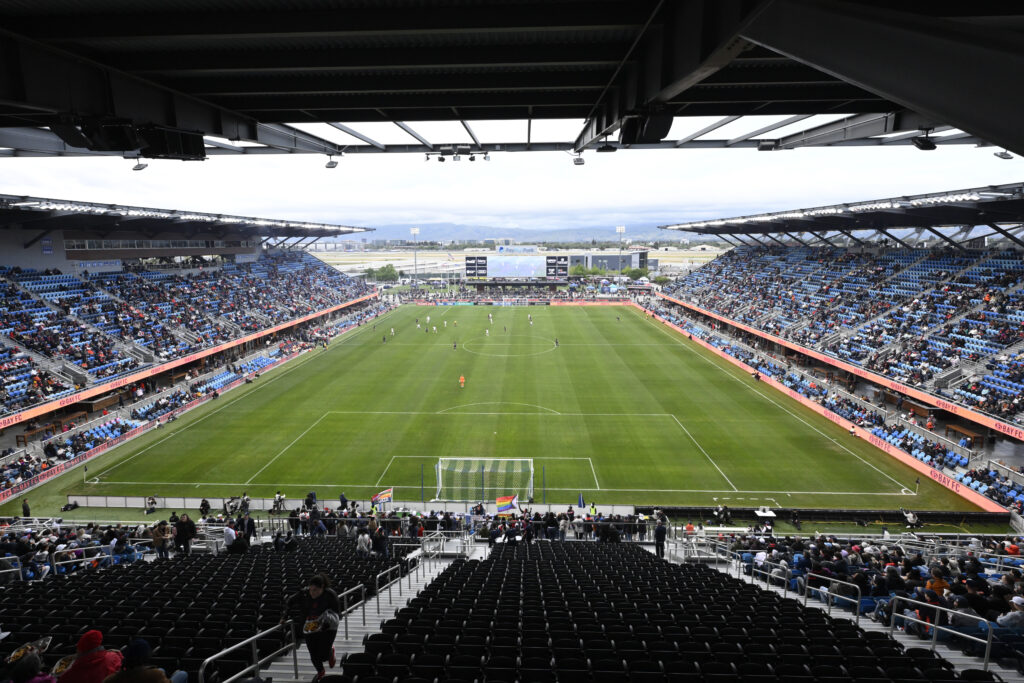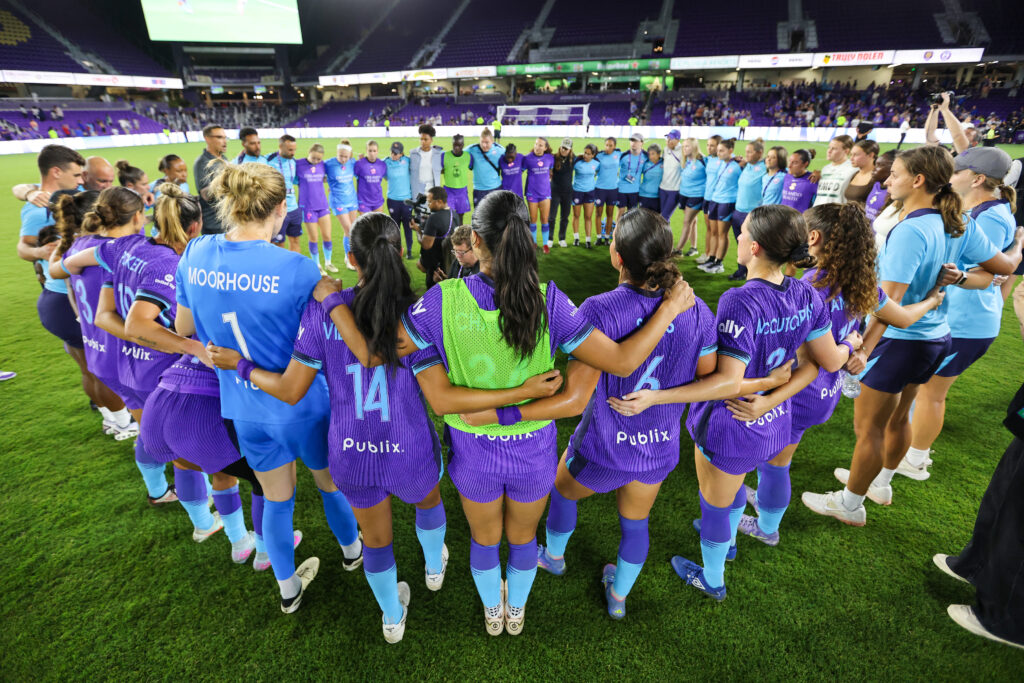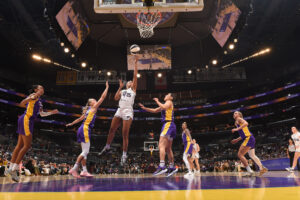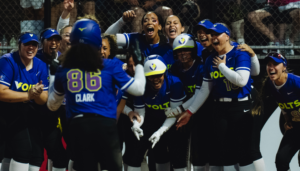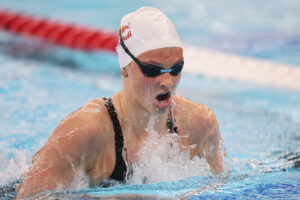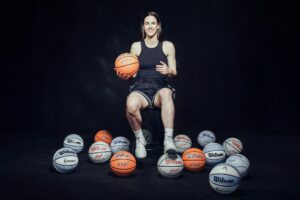Pride Month carries special meaning for the WNBA. In a league where the majority of the athletes are Black and many identify as part of the LGBTQ+ community, a month dedicated to celebrating diversity and inclusion is an opportunity for them to share their values with the rest of the world.
It’s also a celebration that extends far beyond June. For the WNBA Players Association, LGBTQ+ advocacy, with a special focus on combating anti-transgender legislation, is a top priority for the 2021 season.
To get a feel for the conversations being had within WNBA circles, Just Women’s Sports talked with both Seattle’s Candice Dupree and Los Angeles’ Amanda Zahui B. The players discussed being open about their sexuality, the influence their advocacy has on others, what good allyship looks like, and their feelings about the bills targeting transgender youth in sports.
(Editor’s note: This conversation has been lightly edited for length and clarity.)
JWS: We’re nearing the end of Pride Month, when the WNBA is always at the forefront of pushing initiatives and championing differences. What does Pride Month mean to you both personally?
Amanda Zahui B: I think it’s just a month where everyone who doesn’t celebrate our community is celebrating us. Because we don’t do anything different. It’s a month of celebration, but it’s also a weird month because, for these days, it’s so accepting. And then when the month is over, it’s like, all right, we go back to normal and the love and the support and the hype around our community is no longer there. It’s an important month, and I think that a lot of people gain the confidence to open up and really show who they are without the fear of being judged. So that’s beautiful. I just wish that it was like that all the time.
Dupree: I totally get what you’re saying. I mean, I’ve never been one to really give a s*** about what people think about how I live my life. So, I agree. People use June to celebrate instead of celebrating all year round. I guess it’s no different how February is Black History Month. It’s like importance is placed on that, but only for the month of February. So I think as a society, we have to find a way to be accepting all the time and not just in the month of June.
JWS: In this month, too, you see companies put out statements or put rainbow colors on their Twitter logos, and you get the feeling some of it is performative.
Dupree: Yeah, it should be like that all year round. We should know that these companies are inclusive. Like, here in Seattle, you see the flags hanging everywhere. That should be the norm.
JWS: And the WNBA is a leader in keeping this going throughout the year, just based on what you represent and all the work that you do off the court. How do you set that standard as a league?
Dupree: I look at it as, it’s about the next generation and what we’re teaching the people, the kids that are up and coming. I have my two little girls, and I don’t make a big deal about it, but I make sure that they’re aware of it. We took them to Target — their little notepads are actually behind me. The Pride flag, transgender flag is on the notebooks and they open them up, they draw and that kind of stuff. And they get that society is so caught up in, like, pink is for girls, blue is for boys. This is for girls, this is for boys.
So I’m just trying to teach them to be you, be your own individual. It doesn’t matter what people think. They’re only 3 and they’ve gone to school, and one little boy told one of my girls, “Ooh, girls don’t wear that.” Well, why not? Why do they have to dress or look a certain way? And why does that only have to be for boys? And so I just teach them to be open-minded, be accepting, but at the same time, be yourself.
Zahui B: I think it’s also because you lived through it.
Dupree: Yeah, and being a gay person, I have actually never faced any type of discrimination. I’ve never had to deal with any personal issues. I mean, my biggest thing was probably how I came out to my mom. And even for me, it wasn’t that big of a deal compared to other people’s situation.
JWS: It’s so cool that you’re passing that message onto your kids. Because of the platform you have and the way you carry yourselves as players and as a league, have you seen examples of your message and influence being passed onto others?
Dupree: The girls were born early and had to spend a few days in the NICU. So, (DeWanna Bonner) and I were there spending time with them and a doctor walked into their room. … She knew who we were because she knew that we played professional basketball, and she walked in and she thanked us for living our truth, being who we are. Obviously, being a pro athlete, we have influenced people in ways that we don’t even realize, but for her to come in and just thank us for not caring what other people think and being happy, having these girls, that was a huge moment for me. And she was a grown adult woman. So I can only imagine some of the younger generation looking up to us, how much them seeing us impacts their lives in a positive way.
It was definitely very impressionable. It’s a moment that I’ll obviously never forget.
JWS: Amanda, what were the reactions to the Pride story you wrote for the WNBA website earlier in the month?
Zahui B: I got a lot of positive feedback. One of my former coaches came to a game and she just walked up to me when we were shooting and she goes, “Thank you for being so open, for being you.” And she’s a gay, Black woman. And I was like, “Yeah, duh, this is what we do.” And she was like, “No, you being vulnerable and opening up to the whole world about something that some people see as taboo, it weighs heavy.”
JWS: When it comes to marketing women in sports, there’s often this expectation for women to fit into a certain box to be considered “marketable.” Candice, this is your 16th year in the WNBA, Amanda your seventh. How have each of you seen that evolve over time?
Dupree: When I first got to the league, there was no celebrating Pride Month. Like, you didn’t hear anything about it. But looking in the stands, you’re like, man, there’s a good majority of our fan base that can relate to that community. So for me, it was always interesting. I’m a very private person, I don’t put too much of my life on social media. For the most part, I keep to myself. And so in my mind, it was interesting that they didn’t cater to that market more. So I think it’s great that now we have Pride Month and all these different things that they celebrate throughout the course of the season. And I love that they’re all about inclusion and diversity. So to see all of that evolve over the last 15 years, it’s been pretty cool.
Zahui B: And to me, it’s kind of wild that the first Pride game was, I think, in 2014. Because you look up to the stands and, not judging people, but you kind of know who’s in the same community. So we celebrate all of these other things and I can’t imagine the W not celebrating the LGBTQ+ community. Like, it’s so second nature for us. We stand for so much more than just basketball, and that’s something that we constantly keep on saying and preaching. Like, we are actually about it. You just look across our league and we have so many different kinds of people.
Dupree: At a time when you saw, like, no other sports leagues doing that kind of stuff. I don’t think that the WNBA gets enough credit for how forward-thinking they are, and then before you know it, all these other pro sports organizations are trying to piggyback off of it. I saw for the first time the San Francisco Giants had Pride uniforms. I don’t even know how I came across it, and I’m like, wow, now professional baseball has uniforms for Pride Month.
Zahui B: I’m curious to see the men’s side of things, how comfortable everyone in the league is with the topic of sexuality. At one point it was like, we don’t talk about that at all. I would like to hear what they have to say, because us in the locker room, we know that just because I love women doesn’t mean that I’m checking out my teammates. But it’s a different conversation with men. I’m not saying all men, but I’ve had that conversation with men.
I don’t see a lot of them posting that trans lives matter. Yeah, Black lives matter, but all of us matter. Like, it’s not just about our Black men and our heterosexual women. It’s about all of us. And that’s something that the W, like you said, we’re leading the way in that, and everyone else is piggybacking off of and taking baby steps behind us.
JWS: Was there a time when that wasn’t the case in the WNBA, when people weren’t as accepting as they are now?
Dupree: I don’t think I’ve had any issues with that kind of stuff since I’ve been in the league. I guess if somebody does have an issue, they’re probably more apt to not say anything, so you would never know.
Zahui B: I had a conversation with a former teammate where she was telling me her side, and she was like, “I used to be really homophobic.” And I was like, “So, you were really in the locker room, hearing people talk about things that make you uncomfortable?” It was such an interesting conversation because I don’t see how you can hate someone that you don’t know. Like, you don’t know what they’re going through. But then for her to just 180 and be like, “I’m supporting you guys,” I think that’s beautiful.
Dupree: Like two or three years ago, our team sponsor was a major sponsor of the Pride parade in Indiana and so they wanted a few people from the team to partake in it. And nobody responded and said that they were going, and so finally it was like, all right, we’re just going to do it as a team. Then I had two teammates that didn’t show up, like they refused to go. And so that’s why I said you never know how people feel about it until they have to or they’re asked to partake in stuff like that.
So I just had a conversation with them. One was concerned that if she went, everybody was going to think that she was gay. And I’m like, first of all, you play in the WNBA, so everybody already thinks you’re gay. Like, that’s just the stigma behind the WNBA. And then the other one I found out was homophobic for years, but yet she has all these friends that are gay. And she had a bit of a loud mouth in the locker room. I think she had asked us to go somewhere or do something, and I was like, “So, you want us to come and support you, but when it comes time to support us and our community, you don’t want to show up?” I made her really uncomfortable, but it was the truth.
Zahui B: How was the team dynamic after that?
Dupree: I gave her a hard time in the locker room and people were like, “Yeah, Can, tell her!” And then I just left her alone. But it’s crazy because I never would have known. Like yeah, they’ve had boyfriends, but I never would have known that that’s how they really felt had we not encountered that situation. That’s what I mean that people don’t ever say anything, they just kind of go with the flow, and then you really find out how people are when they’re put in certain situations.
Zahui B: Like, if you are somebody that I consider one of my close friends, you better be very comfortable with me talking about my sexual life. You already know this, Candice. I’m very open. You have to be comfortable with me bringing my girlfriend, whoever I’m dating around, just like I’m comfortable listening to you and being around your boyfriends.
JWS: That actually brings me to another question. Candice, you gave an example of calling someone out for not being supportive. But what does good allyship look like?
Zahui B: I think great allyship — it must’ve been Brittany Boyd. It was 2017 on the float in the New York City Pride parade and Boyd was just standing up and saying, “Love who you want to love! I love love!” I think that’s a great example of like, “I don’t want to be with another female, but if that’s what makes my best friends happy, then I’m going to scream at the top of my lungs to the rest of the world to let them know that it’s OK.” And there’s different ways of doing that. But I just think that it’s speaking up, because at the end of the day we are all human beings.
Dupree: Both of us have white moms who had kids with Black guys, but my mom has never been one to shy away from being different. Even within her own family, regardless of how they felt, she did her own thing, she did what she thought was right. And I think that’s something that she’s instilled in her kids. Like, I don’t care who you are, what you do, you don’t get treated any differently.
Zahui B: My mom’s the same way. Any time she sees something that is the Pride flag, she sends it to me. Like, now I have the keychain with the Pride flag.
Dupree: My mom is actually the one that got (my kids) these Pride notebooks when they came here to visit us. She bought them from Target. I’m like, this is hilarious.
Zahui B: My mom goes around and is like, “My daughter’s gay.” And I’m like, “I’m good, mom.”
JWS: We’ve touched on how the WNBA has historically been really supportive of differences. When it comes to outside sponsors — I think of your partnerships with Glossier and Adidas, Amanda, as examples — have they become more tolerating and accepting over the years?
Zahui B: I think that companies and sponsors are getting more comfortable because they gain more numbers. I feel like the companies that I work with, like Adidas, we can sit down and have an open conversation about life and we learn from each other. That way, we can gain more confidence to go out in public and talk about it. … I know Nike does the same thing. It’s not just doing it to do it, but they are gaining the knowledge from us and now they can put it out there in the world because they have a bigger and larger platform. I just appreciate when sponsors or whoever are willing to have the tough conversation. And it’s extra for me and Candice because we are Black, too, so It’s not just being a lesbian. Like, we are Black and Candice is a Black mother who had babies with another Black woman.
Dupree: I’m a Nike athlete and a lot of the Nike athletes are a part of the LGBTQ+ community. So usually, we have Pride shoes that we get to play in, but things have been a little crazy because of COVID. But I think it’s cool. I even get on Nordstrom’s website and you just see all the different product lines that are out now that cater to Pride and the people in our community. So there’s progress, for sure.
JWS: Another priority of the WNBPA’s this year is the anti-transgender legislation we’ve seen sweeping across states. Advocates of those bills are trying to justify them by saying they will help protect women’s sports. What do you think when you hear that? What do you make of those arguments?
Dupree: I’m actually still trying to educate myself more on that topic. People have asked me questions and I’m like, I don’t know. I don’t know enough about it. I actually started a master’s degree program and one of the classes that I took was a psychology class, and part of it was discrimination in sports and gender discrimination. I wanted my case study to be on youth transgender athletes, and I couldn’t even do it because there’s not enough research out there yet regarding the stigma behind all of it.
I watched “Changing the Game” — it was a documentary that came out not too long ago. Even watching that, all my questions are geared toward the scientific part of it. You had one athlete that was a wrestler and he wanted to compete with the boys in high school. And they told him because he was born a female, he wasn’t allowed to. But at the same time, he’s taking hormones and testosterone and they’re making him compete with females. So I’m like, how is that not an unfair advantage on his behalf? Because you’re making him compete with females, but yet he’s taking hormones. It almost doesn’t make sense what they’re forcing him to do. Because now, he’s never going to lose. He’s already taking hormones. And then you have the opposite of that where they think, well, they were born a man, so that’s an unfair advantage. There’s so much that I still want to learn regarding that.
Zahui B: I feel the exact same way. Like you said, I’m not educated well enough on the science part of it. So it’s all just a million thoughts.
Dupree: I think the easiest way to break it down is parents are concerned. Like, you have to think about how big the transgender population is in sports. It’s probably extremely small. And I had a parent ask me, “What are your thoughts on transgender athletes?” She had two daughters that played on a high school basketball team, and she was like, “I don’t think it’s fair that they’re going to get a roster spot over my two girls.” And I’m like, “What are the chances of your daughters having to compete against another transgender athlete?” Like, the population is so small.
Zahui B: In Sweden, we had the first transgender boy or young adult — he was born a female — play basketball. Noel — that’s his name now — played with the guys, and I just thought that was so cool. For him, it wasn’t like, “I need to beat everyone.” It was more so, “We’re taking a step in the right direction, and I played comfortably in the gender and around the other guys that I always felt like I was.” And I was thinking, just imagine that feeling of like, I’m finally home. I get to play basketball as me.
Dupree: Yeah, parents make a big deal out of it, and they’re talking about the safety of girls in the locker room and all of that.
Zahui B: But there are so many arguments I can find against safety in the locker room. Like, it’s so understandable, the stress and the safety of your own child. I don’t have kids yet, and I know I’m going to be over-protective. But at the same time, not everyone is evil because they are different.
JWS: So, education and conversations — is that where the WNBA is on this particular issue at this point?
Dupree: I know that’s where I am personally. As far as the league as a whole, I think right now they’re just trying to stay engaged and understand what these bills are for. But at the end of the day, between the WNBA and the WNBPA, it’s all about diversity and inclusion.
JWS: Yeah, and the WNBA has been involved in this type of activism for so long. Last year, in particular, you showed how influential your voices and efforts can be in society and politics. On a personal level, do you feel even more of a responsibility to use your platform to push for change where it matters most to you?
Zahui B: No, I’m just being me.
Dupree: I don’t know that I look at it as a responsibility. I post what I want to post, whether it’s informative or not, and if people are able to educate themselves by reading stuff that I post, I think that’s great. But yeah, I don’t know that I take it as a responsibility, like I have to do this. Like Amanda said, it’s just being me.
Zahui B: I think we both literally say whatever we mean and whatever we feel like without trying to hurt anyone. And that’s how it is with social media. I think that we both are for love and respect and for world peace, so that’s what we try to post. And it’s not like we think, I have to post this so other people see it. It’s more so, this feels right for me.
JWS: Do you think last year then was an example of more people starting to realize what the WNBA has always been about?
Dupree: Yeah, for sure. Because at the time, it was just us and the NBA. We were the only sports being played. So it was a great opportunity for the league and for the players to get out there and let people know what we’re all about. And I thought everybody did a great job of that.
Zahui B: And we did it as a unit. I think that’s why it was so powerful. Like, we all were on the same page. We all were fighting the same fight together. We’ve never all been in the same space at the same time. And with doing and being the way that we are, there comes a certain kind of responsibility. We can’t neglect that. But I think that we have been just us this whole time, that it was easy. Even when it was hard, it was easy in a sense.
Dupree: I get what you’re saying. Like, just by being ourselves, we were able to show the entire world this is who we are and this is what we stand for. We felt like we were taking on this responsibility to get certain things out there, but it just came naturally.
